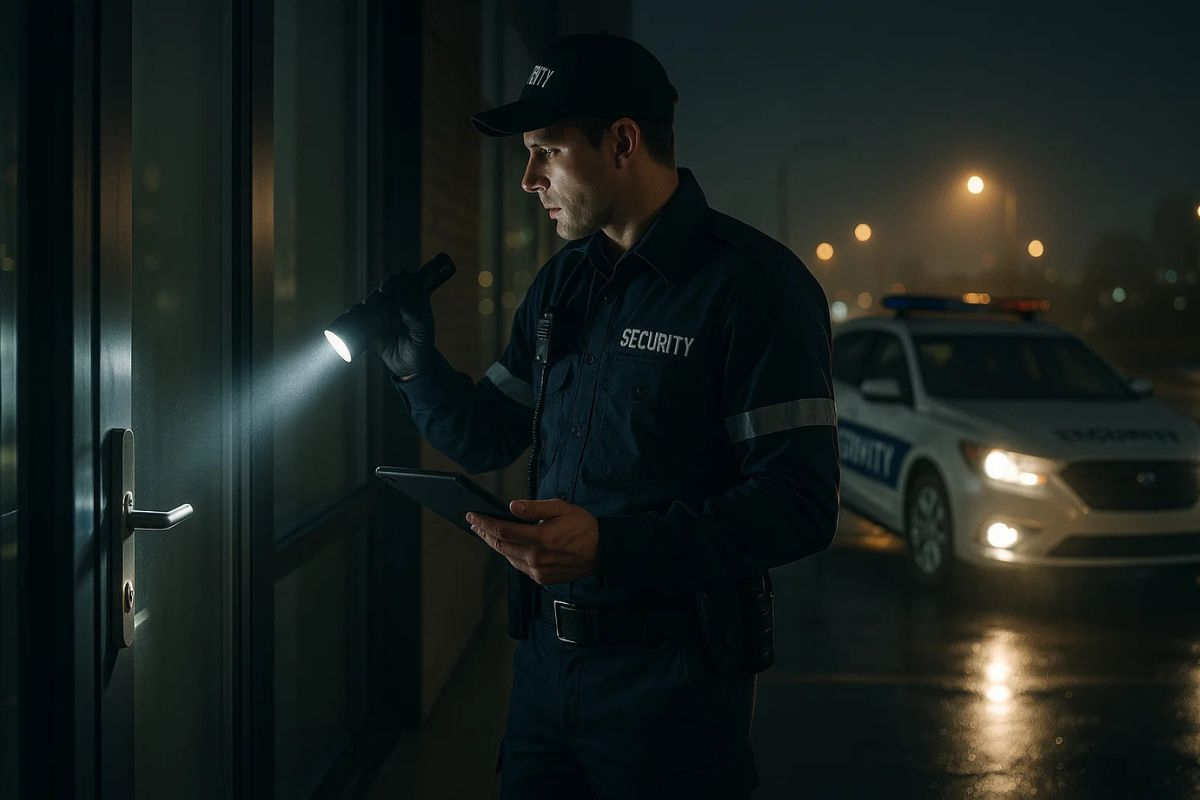7 Security Mistakes Melbourne Businesses Must Avoid

1. Ignoring Professional Security Assessments
Many businesses underestimate the importance of professional security assessments. Skipping this essential step often leads to unaddressed vulnerabilities—such as blind spots in CCTV coverage or outdated access controls. A comprehensive security audit helps identify these gaps before criminals do.
Professional evaluations from reputable Security Services near me can offer insights into site-specific threats. They can recommend the best surveillance systems, alarm setups, and access management practices tailored to your property. Regular reviews also ensure your system evolves alongside new risks.
2. Relying on Outdated Surveillance Systems
Technology moves fast, and so do criminals. Relying on old analog cameras or low-resolution systems can make it easier for intruders to evade detection. Modern IP-based systems with motion sensors, infrared capabilities, and cloud storage have revolutionized the way businesses monitor security.
Upgrading to advanced surveillance solutions ensures real-time alerts, better video quality, and remote monitoring. This means business owners can track activities from anywhere—offering peace of mind and stronger protection.
3. Poor Access Control Management
Unrestricted or poorly monitored access points are a major security risk. Whether it’s employees, contractors, or visitors, every person entering your premises should be accounted for. Many companies still use outdated lock-and-key systems, which are easy to duplicate or lose.
Switching to digital access systems—such as key cards, biometric scanners, or mobile authentication—enhances control and accountability. It’s also wise to regularly update permissions, especially when staff changes occur.
4. Failing to Train Employees on Security Protocols
Even the best security system can fail if your staff isn’t properly trained. Employees are the first line of defense, and human error is one of the most common causes of security breaches. Without proper training, staff may ignore suspicious behavior, mishandle sensitive information, or forget to lock doors.
Conduct regular security training sessions to help employees understand how to identify risks, report incidents, and follow emergency procedures. A well-informed team is one of your greatest assets in maintaining safety.
5. Overlooking Cybersecurity Threats
In today’s digital age, physical and cyber threats often overlap. Many business owners focus solely on physical protection while neglecting online vulnerabilities. Cybercriminals can hack into systems, disable alarms, or access confidential data through weak passwords or unprotected networks.
Implementing robust cybersecurity practices—such as two-factor authentication, firewalls, and secure Wi-Fi protocols—is vital. Consider investing in integrated security solutions that merge physical and digital defenses for complete coverage.
6. Inadequate Lighting Around the Premises
It might seem simple, but proper lighting plays a crucial role in deterring intruders. Dark corners, alleyways, and parking lots often attract unwanted activity. Inadequate lighting not only poses a safety hazard but also makes it easier for criminals to go unnoticed.
Use motion-activated lighting and ensure all entry points are well-lit. Additionally, pairing lighting with security cameras significantly increases visibility and recording clarity during nighttime incidents.
7. Not Having a Security Response Plan
Having advanced security systems is great—but without a proper response plan, even the best technology can fall short. A well-documented security plan outlines what actions to take during emergencies like break-ins, fires, or data breaches.
Every employee should know their role in a crisis. Regularly conduct drills to ensure everyone can respond quickly and effectively. This proactive approach minimizes panic and prevents small issues from escalating into major losses.
8. Neglecting Alarm System Maintenance
An alarm system is only as reliable as its upkeep. Over time, systems can malfunction, batteries may die, and sensors can wear out. Unfortunately, many businesses install alarms and then forget about maintenance until it’s too late.
Schedule regular inspections with certified technicians to ensure all systems are functioning correctly. Updating software and checking signal transmission can prevent costly downtime during critical moments.
9. Forgetting to Secure External Areas
Commercial properties often have outdoor assets—loading docks, parking areas, and storage units—that need protection too. Ignoring these spaces gives criminals easy access points and escape routes. Installing fences, motion sensors, and outdoor cameras provides an extra layer of security.
Regular patrols or mobile monitoring services can also help deter theft and vandalism in these vulnerable zones.
10. Ignoring Corporate Security Integration
As businesses grow, managing multiple security systems separately becomes inefficient. Integrating security operations—CCTV, access control, alarms, and visitor logs—into a unified dashboard improves coordination and decision-making.
Partnering with expert providers like corporate security services in Melbourne ensures seamless integration and professional management. This approach enhances real-time visibility and enables swift responses during emergencies.
11. Failing to Comply with Local Regulations
Melbourne’s commercial security landscape is governed by strict regulations, including privacy laws and surveillance standards. Non-compliance can result in heavy fines and legal complications. Business owners should familiarize themselves with relevant laws or seek expert advice.
Resources such as Wikipedia and official government sites offer general guidance, but consulting a licensed security professional is the best way to ensure compliance and avoid penalties.
12. Overlooking Customer and Visitor Safety
Your customers’ sense of safety directly impacts your reputation. Businesses that neglect visitor safety measures risk losing trust. Secure parking spaces, monitored entrances, and friendly security staff help create a welcoming and safe environment.
Remember, visible security presence not only protects people but also demonstrates professionalism and care for community wellbeing.
13. Lack of Backup Systems
When the power goes out or systems fail, unprepared businesses are left vulnerable. Always have backup power supplies, duplicate recordings, and contingency communication systems. This ensures your business remains protected, even in unforeseen circumstances.
14. Not Leveraging Modern Security Analytics
Security data can reveal patterns in employee movement, visitor traffic, and potential weak spots. Many modern systems include AI-based analytics that detect unusual behavior or unauthorized access attempts. Utilizing this data helps you make smarter, data-driven security decisions.
15. Delaying Security Upgrades Due to Cost Concerns
Some business owners hesitate to upgrade security due to cost. However, failing to invest in protection often leads to higher losses after a breach. Security should be viewed as a necessary business investment—not an optional expense.
Partnering with professionals ensures cost-effective, scalable solutions tailored to your unique needs and budget.
Frequently Asked Questions (FAQs)
1. How often should businesses conduct a security audit?
It’s recommended to perform a professional audit at least once a year or whenever significant changes occur in your business setup.
2. Are small businesses at risk of commercial theft?
Absolutely. Small businesses are often targeted because they tend to have weaker security systems compared to large corporations.
3. What’s the best way to train employees on security?
Provide hands-on workshops, simulated drills, and regular awareness sessions to keep your team alert and informed.
4. Can digital access systems be hacked?
While any system can be compromised, modern encrypted access control systems greatly reduce the risk of unauthorized access.
5. How do integrated security systems benefit my business?
Integration allows centralized monitoring and faster response times, improving overall security efficiency.
6. What should I do after a security breach?
Contact local authorities, secure the area, document evidence, and review your systems with a professional to prevent recurrence.
- Juegos
- Religion
- Party
- Networking
- Music
- Literature
- Art
- Health
- Gardening
- Shopping
- Food
- Fitness
- Film
- Drinks
- Dance
- Crafts
- Causes
- Wellness
- Devotional Reflections
- Bible Study & Scripture Insights
- Prayer & Worship
- Christian Living
- Spiritual Growth & Discipleship
- Testimonies & Personal Journeys
- Christian Theology & Doctrine
- Church Calendar & Liturgical Seasons
- Christian Service & Mission
- Gardening
- Health
- Home
- Literature
- Networking
- Other



